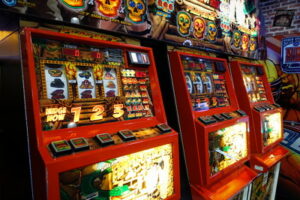 When you hear the term ‘gambling machines’, it’s common to automatically think of the slot machines and similar found in casinos. These are usually heard jingling when someone wins a round, and frequently come with arcade noises built into them, too. However, casinos and betting shops aren’t the only place that these machines can be found. As it happens, they’re present in many other public places.
When you hear the term ‘gambling machines’, it’s common to automatically think of the slot machines and similar found in casinos. These are usually heard jingling when someone wins a round, and frequently come with arcade noises built into them, too. However, casinos and betting shops aren’t the only place that these machines can be found. As it happens, they’re present in many other public places.
However, why is this even a possibility? Considering that they’re in plain sight within pubs, amusement arcades, airports, service stations, leisure facilities and so on, how is it that they are allowed with modern gambling licensing and rules? After all, you need to be 18 to be able to place bets on them, but they are often still found in locations where minors (and vulnerable people) can easily see them. Why is it fine to stop anyone under 18 from going into a casino or bookies, but the machines so often found within these places are on display elsewhere for everyone to see?
And granted, the machines within these places still come with age warnings about using them, but they still exist in places where children and underage youths can see them. Is this something that sends out the wrong kind of message? Especially when children can see adults participating in gameplay, with bright flashing lights and themes that often appeal to minors, too. What laws exist that allow this to happen, and is there a specific licence needed for machines to appear in these locations, too?
Heathrow Promotes Tax-Free Slot Machines
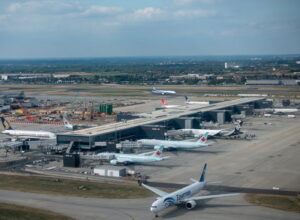 As the biggest airport in the United Kingdom, Heathrow promotes the fact that it is able to provide players with tax-free slot machines to gamble on. Therefore, if you ever find yourself delayed while waiting for your flight, you can take the time to spin the reels of some electronic slot machines in the process. A large number of them exist within Heathrow, spread throughout the concourse.
As the biggest airport in the United Kingdom, Heathrow promotes the fact that it is able to provide players with tax-free slot machines to gamble on. Therefore, if you ever find yourself delayed while waiting for your flight, you can take the time to spin the reels of some electronic slot machines in the process. A large number of them exist within Heathrow, spread throughout the concourse.
More than 50% of the slot machines within the airport are actually owned by British Airways, thanks to the fact that it acquired BMI from Lufthansa back in 2012. While the introduction of slot machines to the airport was discussed at length by the EU regarding its legality, a decision was made in 2008 and the practice was allowed. This, it said, was beneficial to Heathrow overall, which is why the slot machines have stayed active within the airport.
Yet, when it comes down to it, airports are used by families travelling abroad, not just adults. Therefore, not only are children able to see the machines, but also witness adults playing them in plain sight, too. Heathrow is the busiest airport in the UK, meaning that it’s more likely to be seen by more people there. And not just UK residents flying in and out of the country, but visitors who may now have the same available within their own countries.
What is it that makes the installation of such machines into non-gambling premises legal? And how is it possible that this is something that the government allows?
A Gaming Machines Licence Provides All
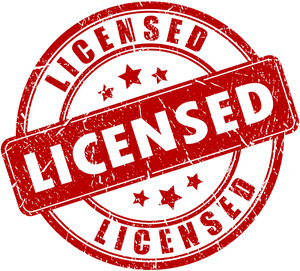 Gaming machines are actually one of the most common forms of gambling to be experienced within the UK. The popularity of them has surged over the years, and this is very much thanks to the fact that they can be accessed outside of standard gambling venues like casinos and betting shops. Therefore, it’s not uncommon to find them in bars, clubs, bowling alleys, airports and so on. And this is all made possible by the possession of a gaming machines licence.
Gaming machines are actually one of the most common forms of gambling to be experienced within the UK. The popularity of them has surged over the years, and this is very much thanks to the fact that they can be accessed outside of standard gambling venues like casinos and betting shops. Therefore, it’s not uncommon to find them in bars, clubs, bowling alleys, airports and so on. And this is all made possible by the possession of a gaming machines licence.
Let’s say that you run a bingo hall or an adult gaming centre or perhaps one of the other venues previously mentioned. If you have gaming machines on those premises, then you will hold a gaming machines licence to offer them to visitors legally. This is because they require you to utilise some of your own money in order to play them.
Certain premises are not allowed to incorporate such machines into their establishments. As part of the Gambling Act 2005, residents won’t be able to introduce slot machines and the like to fast food restaurants or minicab offices, for example. However, it still makes provisions for various other public places to incorporate them into their settings.
All gaming machine licences should be applied for through the UK Gambling Commission directly. Different premises will require different types of licences to be able to offer then, and this also means that different types of gambling machine games can be integrated into them. For example, in a pub, two gaming machines of category C or D can be provided to guests upon notification to the licensing authority. This means that games with a maximum stake of £1 and maximum prize of £100 (as well as any of those below) can be installed.
On the other hand, Heathrow airport and motorway services tend to offer many more than just a couple of machines. This is because they are considered as adult gaming centres. If you’ve ever entered a motorway service station, you’ll probably have seen the sections that are cordoned off for under 18s. Within those sections, category C and D gaming machines can be included, as well as up to 20% of the total number of machines being of category B3 or B4. So, players can stake a maximum of £2 and win a maximum of £500 from those types of machines.
This form of gaming has become so popular as it happens, that one of the biggest motorway service brands in the UK – Welcome Break – has set up its own gaming sector. Titled Welcome Break Gaming, this operates as a self-branded betting arcade that can be found at all Welcome Break sites, with the exception of those that operate Days Inn hotels and motels. You’re able to access 24/7 gambling machines at them, coming from brands like Novomatic, Blueprint Gaming and SG Gaming. Again, these games are found in separate sections that deny entry to under 18s.
The only way that one of these premises can offer games without applying for a licence via the UKGC is by only incorporating category D games. Instead, they must simply request a permit from the local licensing authority to be able to offer them.
The Message Being Sent Out
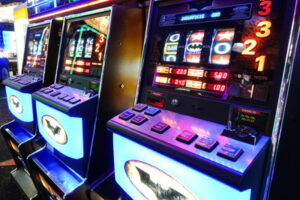 While it’s true that these premises do require a licence to officially operate, what sort of message is this passing on to minors and even to vulnerable people? Even though those with a gambling addiction can take the decision to avoid casinos and betting shops this can all be ruined by stopping at a motorway services or visiting a pub and ending up playing these games.
While it’s true that these premises do require a licence to officially operate, what sort of message is this passing on to minors and even to vulnerable people? Even though those with a gambling addiction can take the decision to avoid casinos and betting shops this can all be ruined by stopping at a motorway services or visiting a pub and ending up playing these games.
It is also worth thinking about the message this sends out to children. The UKGC, and others, are constantly coming up with new plans to reduce the exposure of gambling to children yet a simple family car journey or a visit to a pub with parents can result in a high level of exposure to gambling machines, which by their nature appeal to children. This is further exacerbated when the parents themselves play these games, or indeed let their children stand near them when they play – in some instances even allowing them to press the buttons.
As noted, gaming machines frequently utilise bright lights and intriguing sounds, as well as compelling themes. This means that a minor is just as likely to be captivated by them as an adult is. Despite the fact that there are gambling machines which feature cute kittens or characters from children’s nursery rhymes for example, developers claim that they are not aimed at such youths. Of course, it’s likely that they don’t aim them at children. However, it cannot be denied that any child seeing their favourite animal or cartoon character on a gaming machine will likely find it an appealing prospect.
As many people know, it can be entertaining sitting at a machine of that nature with a child and pressing the buttons on it. The lights on the display move around and flicker, and even though you’re not actually placing any bets at that age, you’re given the idea that maybe you’re playing on something entertaining because of this. Countless stories have been told of kids waiting for money to fall from the bottom of the gaming machine as their parents play. It’s not an uncommon scenario.
License holders are supposed to prevent under 18’s from using these machines but we’ve all been into a busy pub and seen children near them with adults, it is almost impossible to police all the time. Even when adults are challenged by staff many are defensive about the fact they allow their children to watch or help them play, not realising they are breaking the law in the process. And this is understandable given these machines are on public display in places minors can access, it sends out the message that it is OK.
In 2019, it was reported that the number of youths addicted to gambling had quadrupled from the figure three years prior. That report suggested that as many as 140,000 children between the ages of 11 and 16 already had or were at risk of contracting a gambling problem. Additionally, more than one in ten were discovered to have bet their own money in the week prior to the investigation being carried out.
Granted, the online possibilities have really boosted that figure up beyond all expectations. However, the likelihood is that the appeal of the themes built into the games has contributed too. And potentially, many children have seen these in operation within airports, service stations and so on and see them as part of normal life.
Failures in Pubs at Stopping Under 18s from Gambling
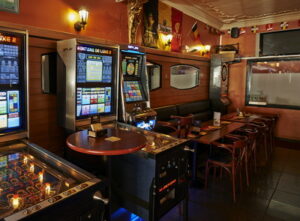 It was two years ago that the UK Gambling Commission also highlighted the failure of many pubs to stop under 18s from using their gambling machines. The test carried out on a number of public houses in England, indicated that close to 90% of these establishments failed to prevent children from accessing the terminals.
It was two years ago that the UK Gambling Commission also highlighted the failure of many pubs to stop under 18s from using their gambling machines. The test carried out on a number of public houses in England, indicated that close to 90% of these establishments failed to prevent children from accessing the terminals.
Employees of those pubs are expected, as part of the licence granted by the Commission, to stop children from accessing them. Clear signage should also be in place to indicate the age restriction, too.
It’s one of the biggest failures for underage activities in the UK. Even the average failure rate of 15% to 30% for alcohol and tobacco being purchased by minors pales in comparison to the gambling statistics. The Commission proceeded with writing a strongly-worded letter regarding their compliance with the rules surrounding their gambling licences.
Concerns Over Amusement Arcade Games
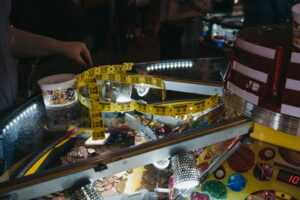 It was only around one year later that children were banned from being able to place bets on fruit machines within amusement arcades. Unaccompanied under-16s in amusements were able to insert money into slots and play the games without issue. However, as part of The Daily Mail’s campaign to curb child gambling, arcade owners must take action to stop them from participating in such.
It was only around one year later that children were banned from being able to place bets on fruit machines within amusement arcades. Unaccompanied under-16s in amusements were able to insert money into slots and play the games without issue. However, as part of The Daily Mail’s campaign to curb child gambling, arcade owners must take action to stop them from participating in such.
According to data, fruit machines that have maximum stakes of 10p and payout up to £5 per spin, provided the most common route for children to become gamblers. Until 2019, children were legally able to play those lower category games without an adult being present alongside them. Yet, campaigners who targeted the fixed odds betting terminals (FOBTs) in recent years, noted the similarity between them and fruit machines. The maximum stake on FOBTs was cut to £2 last year, but this had no effect on readily accessible amusement machines.
Arcade owners must now take responsibility for stopping children from betting on the fruit machines within their premises. Children under 16 can only legally play them now if they’re accompanied by someone 18 or over. Other category D games, like penny pushers and crane grab machines, are not affected by the new laws though, so children can still access them without an accompanying adult.
It may seem quite silly to some, but a police officer from Dorset lost £250,000 while suffering with gambling addiction, and he stated that the fruit machines in arcades were the gateway towards this. Alex Macey spoke of playing on the fruit machines from the age of 10 with his pocket money, and later on, with coins that he stole from his mother. This, he stated, is what got him involved in gambling in the first place.
Is it so hard to believe then, that minors would also be attracted to playing such games found in airports, pubs, bowling alleys and so on? They’re just as readily accessible and can clearly lead to addiction later on down the line.